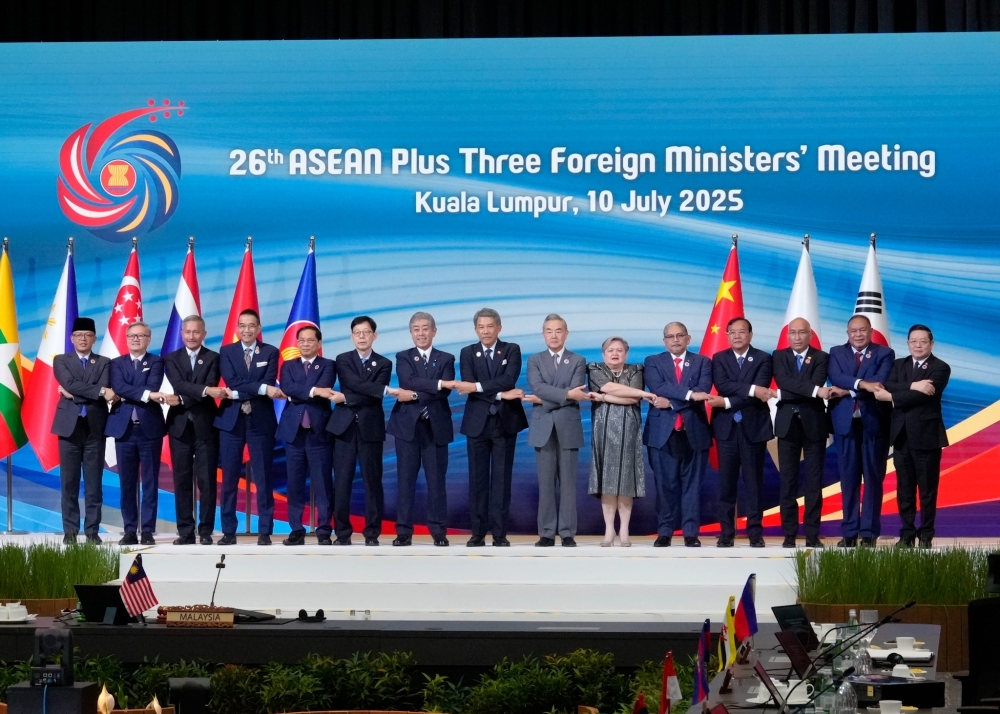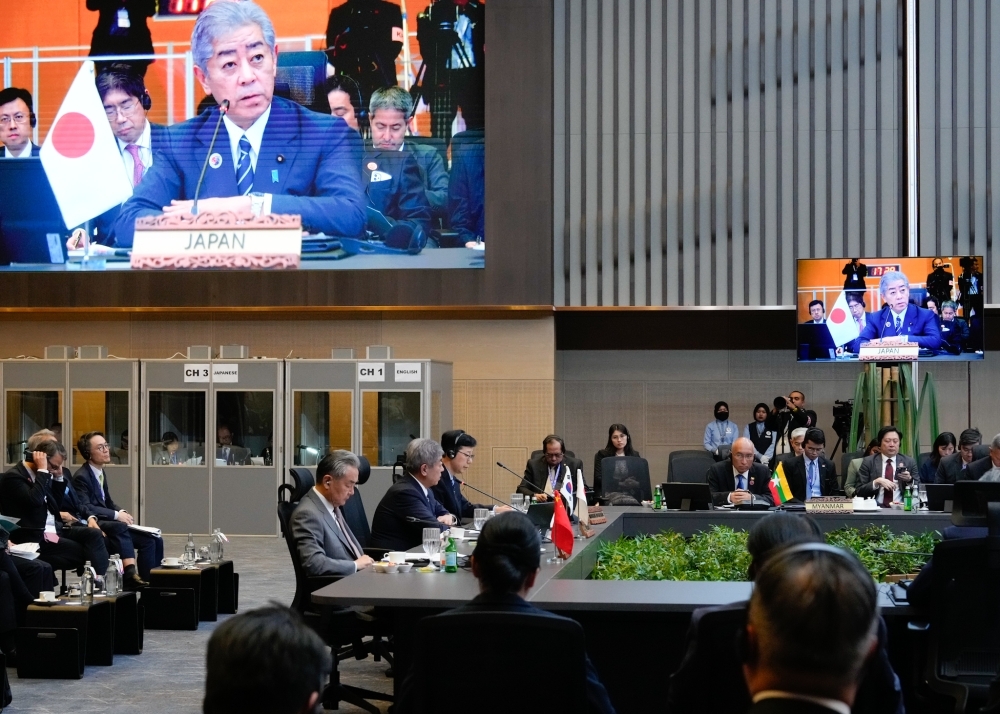Japan-ASEAN Relations
The 26th ASEAN Plus Three Foreign Ministers’ Meeting


On July 10, commencing at 5:15p.m. local time (6:15 p.m., JST) for about 100 minutes, Mr. IWAYA Takeshi, Minister for Foreign Affairs of Japan, attended the 26th ASEAN Plus Three Foreign Ministers’ Meeting in Kuala Lumpur, Malaysia. The overview of the meeting is as follows.
1. Opening Remarks
The outline of Minister Iwaya’s statement is as follows :
- Since the ASEAN+3 was established in 1997, the importance and the role of the ASEAN+3 in the international economy has expanded significantly. Working together within the ASEAN+3 framework to resolve the common challenges facing the region is extremely important and has great potential. Japan highly value the practical cooperation centered on strengthening regional safety nets particularly in the areas of finance and food security, and the contributions that the ASEAN+3 has made to the safety and prosperity of the region.
- With the international community in turmoil, the principles of the ASEAN Outlook on the Indo-Pacific (AOIP), such as a rules-based framework, openness, transparency and inclusiveness, are becoming increasingly important in view for leading the international community from division to cooperation. Japan will promote initiatives that contribute to the promotion of the AOIP also within the ASEAN+3.
- Japan currently chairs the Japan-China-Korea Trilateral Summit. As the trilateral process and ASEAN+3 cooperation have synergistic effects, Japan will continue to work closely with China and Korea to promote future-oriented cooperation that is also beneficial to ASEAN with the Trilateral Summit to be held in mind.
2. ASEAN+3 Cooperation
- Minister Iwaya expressed Japan’s full support for the “ASEAN Community Vision 2045” and its commitment to furthering the ASEAN+3 cooperation in line with the Vision. Minister Iwaya outlined the three areas of Japan’s focus in his remarks as follows: First, on economic and financial cooperation, Japan would like to work with other countries to enhance a rules-based, free, fair and open international economic order amidst rising tensions over the global economy and international trade. In this regard, ensuring the transparent implementation of the RCEP Agreement is important. Japan is pleased that the Rapid Financing Facility (RFF) under the Chiangmai Initiative Multilateralization (CMIM) was established in May, strengthening financial safety nets against pandemics and natural disasters in the region. Japan hopes that the functions of the ASEAN+3 Macroeconomic Research Office (AMRO) will be further strengthened under the leadership of new Director Watanabe Yasuto, and will support its efforts to ensure economic and financial stability in the region.
Second, on responses to common challenges, Japan highly appreciates the quick response of the ASEAN Coordinating Centre for Humanitarian Assistance on Disaster Management (AHA Centre) to the earthquake that struck Myanmar in March. Japan will continue to take the lead in broad cooperation in the field of disaster risk reduction. On regional food security, the efforts under the ASEAN+3 Emergency Rice Reserve (APTERR) and the ASEAN Food Security Information System (AFSIS) are important. Japan would like to deepen cooperation on the low birthrate and aging population through sharing knowledge and experience of Japan, China and Korea, and supporting the efforts of the ASEAN Centre for Active Ageing and Innovation (ACAI), and work collectively to build sustainable economies and societies in the region.
Third, organized fraud based in some ASEAN countries is a serious issue that causes significant economic damage and threatens the safety and property of the people of the ASEAN+3 countries. Japan supports the efforts for capacity building through the United Nations Office on Drugs and Crime (UNODC) as well as information sharing among practitioners in Bangkok. Japan will continue to cooperate with other countries and international organizations. - Other participating countries expressed their determination to further promote cooperation within the ASEAN+3 framework, and spoke on their undertaking initiatives and priority areas of cooperation, including economic and financial cooperation, health, food security, and the digital economy.
3. Regional and International Issues
- Minister Iwaya underscored North Korea’s advancement of nuclear and missile development and the need for the complete denuclearization of North Korea in accordance with UN Security Council resolutions. Minister Iwaya also expressed concerns over military cooperation between Russia and North Korea, and intention to work closely with others, including on the full implementation of the UN Security Council resolutions. Moreover, Minister Iwaya asked for the continued understanding and cooperation of the ASEAN+3 countries for the immediate resolution of the abductions issue.
- Other participating countries remarked on North Korea’s missile development issues and the importance of its complete denuclearization.
4. Closing Remarks
Minister Iwaya expressed Japan’s intention to deepen future-oriented cooperation in a wide range of areas including economy, finance, disaster risk reduction, food security, and measures against online fraud. Minister Iwaya also showed Japan’s willingness to pursue Trilateral discussions at the Summit to be held with possible cooperation with ASEAN in mind, and stated that he looked forward to cooperation under the ASEAN+3.
[Attachment]
Chairman’s Statement (PDF) 

